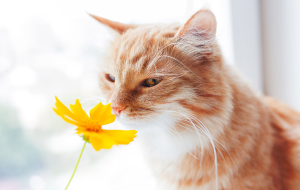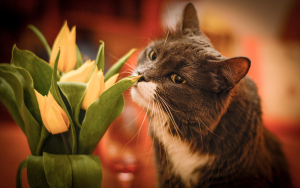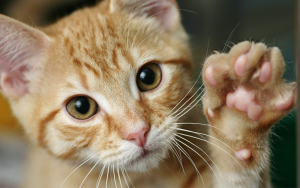Why Does My Cat Lick Me? Unraveling the Mystery Behind Cat Behavior

Cats are known for their intriguing and often mysterious behaviors, and one of the most common actions that baffles pet owners is their cat’s tendency to lick them. Whether it’s a soft, affectionate gesture or a more intense, persistent action, cat licking
is a multifaceted behavior that can have various meanings. In this article, we’ll delve deep into why cats lick their owners, what it means in different contexts, and how to interpret these actions to strengthen the bond between you and your feline
friend.
Table of Contents
- Introduction
- The Basics of Cat Licking Behavior
- Affectionate Licking: A Sign of Love and Bonding
- Grooming Behavior: Your Cat’s Way of Caring for You
- Marking Territory: Licking as a Territorial Instinct
- Stress and Anxiety: When Licking Becomes Compulsive
- Licking for Attention: Seeking Your Interaction
- Health-Related Reasons: Why Your Cat May Be Licking Excessively
- How to Respond to Your Cat’s Licking
- Conclusion
1. Introduction
Anyone who has spent time with a cat has likely experienced the sensation of their furry friend licking them. While a cat’s grooming habits are well-known, the act of licking a human is not always as straightforward as it may seem. Is it simply a sign
of affection, or is there something more complex at play? Understanding why cats lick their owners can help deepen the bond between pet and owner and lead to a more harmonious relationship.
2. The Basics of Cat Licking Behavior
Cats are meticulous groomers by nature. Their tongues are covered with tiny, backward-facing barbs called papillae, which help them clean their fur and remove loose hair. In the wild, cats use grooming as a survival mechanism, not only for cleanliness
but also to regulate body temperature and reduce scent markings that predators might track.
However, when your cat licks you, it’s not always about hygiene. Cats may lick their human companions for a range of reasons, many of which are rooted in their social and emotional instincts. Understanding the motivation behind your cat’s licking can
provide valuable insight into its emotional state and needs.
3. Affectionate Licking: A Sign of Love and Bonding
One of the most common reasons cats lick their owners is to express affection. In feline behavior, licking is often a bonding gesture. Mother cats lick their kittens as part of grooming and care, and this behavior carries over into adult cat relationships.
When a cat licks you, it may be mimicking this maternal behavior, showing that they consider you part of their family.
If your cat licks you gently and intermittently, it’s likely a sign of trust and affection. This licking serves as a way to strengthen the bond between you and your cat. It’s similar to how cats will groom one another in a social group to reinforce their
connections.
4. Grooming Behavior: Your Cat’s Way of Caring for You
Cats are naturally inclined to groom themselves as part of their routine. This grooming behavior, called allogrooming, is not just about hygiene but also a way to show care for others. If your cat licks you, it could be a sign that they are treating you
as part of their social group, offering to groom and take care of you.
In multi-cat households, you might notice that cats often groom one another, particularly when they have formed close bonds. Your cat may be attempting to perform the same grooming ritual on you as part of their instinctive need to care for their loved
ones.
5. Marking Territory: Licking as a Territorial Instinct
Another reason cats lick is to mark their territory. While it may seem like a simple grooming action, licking can be a cat’s way of claiming you as their own. Cats have scent glands in their cheeks and paws, and when they lick you, they may be depositing
their scent onto your skin.
This behavior is often seen as a sign that your cat considers you part of their territory. It’s not just about affection; it’s about marking you as a familiar, safe, and secure part of their environment. By licking you, your cat is reinforcing its bond
with you and asserting its ownership of the relationship.
6. Stress and Anxiety: When Licking Becomes Compulsive
Sometimes, licking can go beyond a simple act of affection or bonding. If your cat begins licking excessively or compulsively, it could be a sign of stress or anxiety. Cats are sensitive creatures, and changes in their environment—such as moving to a
new home, the introduction of a new pet, or disruptions in their routine—can trigger stress responses.
Excessive licking can sometimes be a coping mechanism for your cat, providing them with a sense of comfort or control. If your cat is licking more than usual, particularly in a repetitive manner, it’s important to assess their environment and look for
signs of stress or anxiety. Consult your veterinarian if the behavior persists, as they may recommend behavioral modifications or therapies to help alleviate your cat’s stress.
7. Licking for Attention: Seeking Your Interaction
If your cat licks you frequently, it may simply be trying to get your attention. Cats are very skilled at communicating their needs, and licking can be a way of seeking physical interaction or a sign that they want to be petted, fed, or otherwise attended
to.
Some cats are particularly vocal and demanding, and licking may serve as a non-verbal cue that they are in need of something. If your cat seems to lick you at certain times of the day, like when it’s close to mealtime or when they want to be let outside,
it could be their way of telling you they want something from you.
8. Health-Related Reasons: Why Your Cat May Be Licking Excessively
While licking is often a normal and natural behavior, there are instances when it can indicate an underlying health issue. Cats that lick excessively or inappropriately may be experiencing discomfort or pain.
Some health issues that can lead to excessive licking include:
- Skin Conditions: Fleas, mites, or allergies may cause itching, prompting your cat to lick excessively to soothe the irritation.
- Dry Skin: Environmental factors like dry air can lead to flaky skin, causing your cat to lick more frequently.
- Oral Health Problems: Dental issues, such as gum disease or tooth pain, may cause a cat to lick their mouth area frequently.
- Gastrointestinal Issues: In some cases, gastrointestinal discomfort may lead to excessive licking.
If you notice that your cat’s licking behavior changes suddenly or becomes excessive, it’s essential to consult your veterinarian to rule out any medical conditions. Addressing underlying health issues promptly can help alleviate the behavior and ensure
your cat’s well-being.
9. How to Respond to Your Cat’s Licking
Understanding your cat’s licking behavior is crucial for maintaining a positive relationship with your pet. Here’s how you can respond to their licking:
- If it’s affectionate: Enjoy the moment and reciprocate with gentle petting or affection. Your cat is likely showing love and trust.
- If it’s excessive or compulsive: Monitor your cat’s behavior for signs of stress or discomfort. If needed, consult your veterinarian for advice.
- If it’s for attention: Acknowledge the behavior by offering your cat attention, but avoid reinforcing the behavior with treats or food unless they are asking for it.
By being responsive and observant, you can better understand your cat’s needs and ensure they feel secure and loved.
10. Conclusion
Cat licking is a complex behavior with multiple possible explanations. Whether it’s a sign of affection, a grooming ritual, or a response to stress or anxiety, understanding why your cat licks you can help you build a stronger, healthier bond with your
feline companion. Pay attention to the context of the behavior, and consider the overall health and environment of your cat. By doing so, you can ensure that your relationship with your cat remains positive and fulfilling for both of you.
Remember, every cat is unique, so take the time to observe and respond to their individual behaviors. Your cat’s licking may simply be their way of saying, “I love you.”







